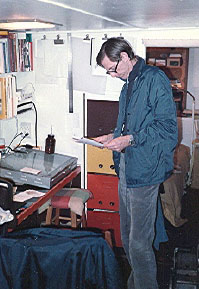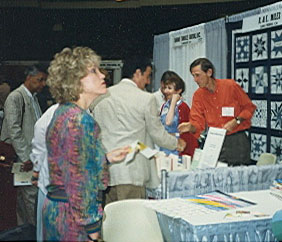AS AN AUTHOR, I AM BUT ONE MEMBER OF THE "BOOK TEAM"
by
Chris Maser
Regardless of what I am writing, as an author, it's my responsibility to be as clear in what I say as humanely possible. It is not the reader's responsibility to understand what I have written. With this self-imposed charge, I must understand that language is not just about naming things or defining things. It's primarily about giving life to an "idea." But what is an "idea?"
An "idea," like everything else humanity has given a name to, seems to arise in the universal ethers and infiltrates the mind as an insight, a flash of intuitive understanding, a Cosmic recognition—but of what? It's precisely the "of what?" that's the problem with language. Words, those structured sounds we utter in our need to share our search for meaning in life, are merely symbols, metaphors whereby we approach, but never touch or capture, the object of our focus, the object we attempt to convey by the words we use.
Put differently, words define the mental boundaries of our perceptions. Therefore, when we speak, we are transferring boundaries of meaning attached to the names of things, time, actions, and qualifiers, all of which are in some way concrete. With the invention of each new word (each new name), we humans are attempting to simultaneously explore, define, and refine the boundaries of meaning attached to our perceptions of the world around us—boundaries encompassed in the names by which we recognize what we see, be it a bird, a tree, a rock, a motion, or the perceived passage of time.
Every human language—the master tool representing its own culture—has its unique construct, which determines both its limitations and its possibilities in expressing myth, emotion, ideas, and logic. As such, language is the medium with which the condition of the human soul is painted.
The artist, using words to convey the colors of meaning by mixing them on a palette of syntax, composes the broad shapes of a cultural story line. Then, by matching the colors of words to give expression to ideas, the artist adds verbal structure, texture, shades of meaning, and hue to the story. In doing so, the verbal artist paints a picture or portrait as fine as any accomplished with brush, paint, palette, and canvas; with camera and film; or musical instruments and mute notes on paper. In addition, a verbal picture often outlasts the ravages of time that claim those of paint on canvas, imprints of light on photographic paper, or instruments that give "voice" to mute shapes.
Having said this, I will be the first to admit that conveying anything through language is, at best, a difficult undertaking. Here, the challenge is that I know what I'm attempting to convey, but the reader has not a clue until they have read what I have written. Even then, I may be unclear to the reader, as an unclear editor once pointed out to me when she didn't understand something I had written: "Chris, you're confused," she admonished.
I, in turn, replied: "What I mean is absolutely clear to me, but I may be confusing to you by how I say it. In other words, I'm patently not confused, but I may be confusing you."
Although I feel myself in touch with the universe of ideas when I write, I know that both the reader and I are well and truly alone with the range of human experiences archived through the millennia in the words I have committed to paper. Moreover, our personal sense of a word's meaning is filtered through our respective lenses and thus colored by our own life's experiences and our subsequent interpretation and perception of their meaning.
There is another important facet to being an author, namely the trusteeship of an idea. Why, I wonder, is one person granted the gift of a specific idea and not another? Ideas seem to be part of the global, etheric commons, or perhaps of the "collective unconscious," as Swiss psychiatrist Carl Jung termed it. By that I mean, to be alone with an idea, is to visit in silence with every human who in any way helped to shape the precursor of the idea though the collective thought that, in time, led to an expression through language. Without the expression of thought, the world would be devoid of even a single idea.
As an author, having been granted the guardianship of an idea, my greatest challenge is to be worthy of the gift. In this endeavor, I have invaluable allies—reviewers, an acquisition editor, more reviewers, a copyeditor, and a publisher.
Sometimes funny things happen. One of my recent books, which I wrote with two wonderful coauthors, is a prime example. The title is, "Trees Truffles, and Beasts: How Forests Function," by Chris Maser, Andrew W. Claridge, and James M. Trappe. We, in turn, worked with a fantastic artist, Gretchen Bracher, whose renditions are superb, to say the least. However, like me, Gretchen suffers with dyslexia, which causes us to transpose letters, numbers, and sometimes even words. Another challenge with dyslexia occurs in the realm of spelling, wherein misspelled words simply do not register—were it not for the spell checker on my computer, I'd be in real trouble. That said, however, my spell checker does not recognize wrong words.
Now, having led you to this delicious place, look at the above title and authorship, and see if you can find the seven dyslexic errors in the cover—errors that gave us a wonderful, understanding chuckle, once Jim pointed them out, that is.
Before I submit a manuscript to a publisher, I send it to at least three people I respect to review my interpretation of the idea from different points of view to ensure I have that I have been intellectually holistic. When possible, I find two special reviewers: one who knows nothing about the subject to read it for clarity and the other who will basically disagree with what I have written to make sure I am fair in my assessment and that my presentation does not have unintentional barbs hidden within. It's also my responsibility to give the perspective publisher the very best manuscript I am capable of producing. That much, I owe to the idea for the privilege of being its temporary caretaker.
I then search for a publisher who sees the same value in the idea that I do. This is no simple task in today's world of global finance. However, finding the right publisher is a two-way street in that I interview them, even as they interview me. This seems fair to me. After all, the publisher is taking the financial risk in accepting my book, and I am taking the professional risk in accepting the quality of book the publisher creates. And thus begins the earnest building of the "Book Team."
The next team member is the acquisition editor to whom I send my manuscript. If the acquisition editor finds value in the manuscript and thinks it might fit in with the kind of books the press published, the manuscript gets passed through yet another set of reviewers to garner their opinions. If the manuscript passes muster with the reviewers, it may to directly to the publisher for a final decision or through a committee for its recommendation. Either way, when a final decision is reached to publish the manuscript as a book, it goes to the copyeditor.
I have known a number of authors whose egos were such they thought themselves beyond the need of a copyeditor. Granted, a truly excellent copyeditor, like everything else of excellence, is rare, but what a blessing it is to work with one of such consummate skill. I have learned more about writing from good copyeditors than I ever learned in class. Moreover, a good copyeditor makes me look better as an author than I really am.
Copyediting completed, the person who designs and lays out the book adds their skill, sensitivity, and insight to the message between the covers that, once again, improves my image as an author. And the artist who designs the cover holds within their hands the key that will decide who picks up the book and finds enough interest in the initial presentation to venture into the magic world of an idea.
As the book is being completed, the person who will market it conceives the strategy through which it will reach the reader. Although this is an increasing difficult task in the world of chain bookstores that largely determine what people read, successful distribution increases the public's awareness of me as an author—again to my benefit.
At last, after months—or even years—of labor, there comes the reader for whose benefit all the work has been done. Without this final member of the "Book Team," the whole endeavor is for naught. I say this because a book without a reader is like an ocean without a schooner to ply its waters by tacking with the wind. Within an unopened book resides the unexplored world of an idea whose boundaries of meaning sleep in the printed word until they are awakened by an inquisitive mind.
I gratefully dedicate this essay to Robert Miles, a one-person "publishing house" (R. & E. Miles) operated out of the basement of his home. Bob had the courage to publish my first non-government book—"The Redesigned Forest."
Bob working on a manuscript in his "publishing house."
Bob and Elaine (the "E." in R. & E. Miles) at a bookfair.
On September 21, 2006, I got a letter from Alan Watson Featherstone, Executive Director of "Trees for Life" in Scotland, in which he said: "Of all the many authors I've used over the years, you are the most efficient and easiest to deal with." Finally, I may have fully earned the privilege of being part of the book team.
©chris maser 2006. All rights reserved.


